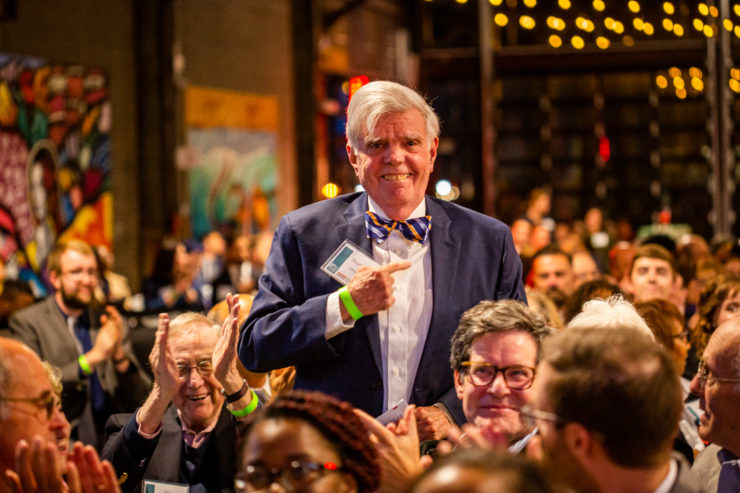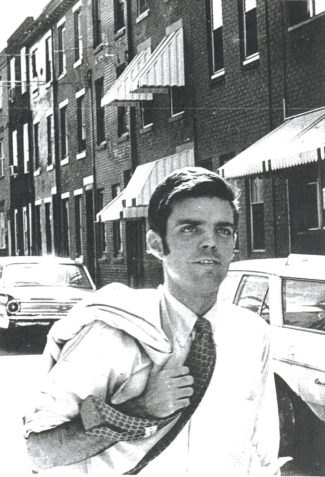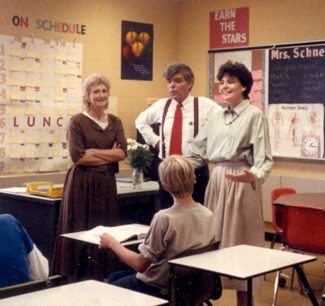
The Public Interest Law Center is sad to share that Thomas K. Gilhool, our former Chief Counsel and an inspiration throughout our history, died on August 22, 2020 at the age of 81. Tom helped bring about generational advances in the rights of people with disabilities nationwide, leading the first case establishing the right to public education and championing the movement for services based in the community. He was also a founding figure in civil legal aid, and he used the law throughout his life to give voice to all those who are underrepresented and ignored in public policy, advancing access to healthcare, police accountability, education, and more. Tom led our organization as Chief Counsel for more than 25 years, beginning in 1975. His contributions and his example are extraordinary, and we will miss him deeply.
Those who knew Tom recall his creativity, passionate spirit, perseverance, driving energy, and leadership. He was a force of nature. When he found a path forward for advancing justice, he inspired others to follow and gave them the tools and knowledge to do so. Tom was not content to simply win the day in court for his clients; he was tireless in his commitment to helping them make real change, even if it took decades. He understood that the law did not exist in a silo, but advanced rights in concert with social movements of people demanding recognition and dignity. With skill and determination, Tom took on entrenched forms of discrimination and made a profound difference.
In an oral history of his work compiled by Temple University, Tom urged those who followed him in the work of advancing equality to remain vigilant and persistent. “The largest trap for the Disability Movement,” he said, “for any movement, for anyone with a need and a deep wish to see the equality commitments of the United States recognized and more fully realized, is summed up in one of two phrases: ‘that’s the best we can do,’ or ‘it made no sense to try, because we wouldn’t have gotten anything.’”
Each of us should hope to be able to live up to his charge. All of us at the Law Center send our sincere condolences to Tom’s wife Gillian, his children Bridget and Nicholas, his brother Bob and his sister Beth, and all of his family and friends.
The Philadelphia Inquirer published an obituary on August 28, 2020.
Robert Nelkin, an advocate for people with disabilities who worked with Tom, wrote “A tribute to Tom Gilhool and an open letter to present day human rights activists.”
Thomas K. Gilhool, 1938-2020
We will be adding to this account of Tom’s extraordinary career with remembrances from those who knew him and worked alongside him.

From the start, Tom was deeply committed to the principles of equality. As a law student at Yale in the early 1960s, Tom was one of the founders of the Northern Student Movement, a group working to advance civil rights in the North in affiliation with SNCC. This group became known for their educational projects in Northern cities, and Tom chaired the Philadelphia Tutorial Project. As a young attorney, Tom was part of the first generation of legal service lawyers, helping support the founding of Community Legal Services and winning the first legal services case at the US Supreme Court, Shapiro v. Thompson. He ran for Philadelphia City Council twice in the late 1960s and was active in supporting social movements, helping in litigation to desegregate Girard College and representing the Welfare Rights Organizations in the city during the war on poverty.
Tom worked with the Law Center from its beginnings and became our Chief Counsel in 1975. Along with Michael Churchill, he led the organization until 2006, and remained as a valued advisor until his retirement in 2008. He took time away in 1986 to serve as Pennsylvania Secretary of Education for Governor Robert Casey for three years and to spend a year as a schoolteacher at Philadelphia’s Roberts Vaux Middle School.
When Tom began his work alongside the disability rights movement in the early 1970s, children with developmental disabilities were legally and routinely turned away from public schools. Instead, thousands of people with disabilities were warehoused in segregated institutions, where they were frequently denied educational services and subject to abuse and neglect. In his concurring opinion Cleburne v. Cleburne Living Ctr, Supreme Court Justice Thurgood Marshall described this system, rooted in a history of eugenics and prejudice, as “a regime of state-mandated segregation and degradation…that, in its virulence and bigotry, rivaled, and indeed paralleled, the worst excesses of Jim Crow.”
As Fred Pelka described in his authoritative history of the disability rights movement, Tom was the attorney most responsible for changing this system and supporting the rise of services integrated in the community. In 1972, Tom successfully litigated PARC v. Commonwealth Pennsylvania, which established that Pennsylvania was responsible for providing a free public education to all children, regardless of disability. It was the first case of its kind, and it helped spark a nationwide movement of similar cases across the country. Immediately following the ruling, Tom worked with PARC and others to ensure that every child who was newly eligible for public education would be able to receive one.

Congress responded in 1975 by passing the law now known as the Individuals with Disabilities Education Act (IDEA), establishing a nationwide right for students with disabilities to receive a free appropriate public education. Throughout his life, Tom kept a close eye on new developments in special education law, lobbying congress when IDEA was renewed to ensure that the promise of education for all was maintained.
The disability rights and advocacy organization PARC, now known as the Arc of Pennsylvania, next enlisted Tom to fundamentally challenge the system of exclusion that people with disabilities faced. Years of experience led the Arc to conclude that reforms to large, state-run institutions would not be enough. States must move to close these institutions entirely, and provide services in settings integrated in the community.
Tom represented PARC in a class-action complaint, Halderman v. Pennhurst, filed by residents challenging the horrendous conditions at Pennhurst State School and Hospital. At Pennhurst, developmentally disabled residents were often needlessly restrained, denied educational services, and abused by staff in prison-like conditions. In 1977, U.S. District Court Judge Raymond Broderick ruled that the segregation of Pennhurst residents and the conditions that they experienced violated their constitutional rights, issuing an order requiring the state provide residents with homes in the community that provided appropriate services. After a decade of appeals including three oral arguments in the US Supreme Court, we reached a settlement in 1986 to close the facility.
Pennhurst was a watershed moment in the movement for community-based services. Tom went on to file and support class action cases supporting community based services in states across the country over a period of more than 30 years. According the National Council on Disability, in 1967, more than 200,000 people with disabilities were housed in large state-run institutions. By 2009, that number had shrunk to 33,000, and it continues to decline.
Other major projects Tom helped support during his time at the Law Center include police accountability and reforms in access to healthcare. In 1990, Tom led a coalition of legal services organizations to enforce a new provision of the Social Security Act, which required states to provide comprehensive health care to children enrolled in Medicaid. The ensuing litigation led to the additional enrollment of 300,000 children in Pennsylvania and led to similar cases in several other states.
In 2003, Tom received a Senior Fulbright Fellowship in Japan, where he brought together advocates for disability rights from both countries. This work led him to contribute the drafting of the United Nations Convention on the Rights of Persons with Disabilities, which was adopted in 2006 and has been ratified by 181 nations.
Tom’s papers and records are preserved in the Temple University Urban Archives for those who wish to learn from his remarkable work.
